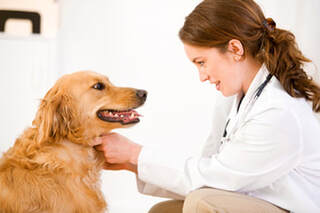
By Holistic And Organix Pet Shoppe
Many times when pet parents take their pets in to see the vet for whatever reason, pet parents have come home without further answers or test results. Many are given a prescription medication with providing warnings of the risk and send you home. You should be prepared before walking in to know what to ask for before leaving. So, no matter what reason you are there for, make sure you get all the facts, ask lots of questions, and get copies of any tests ran and know which tests to ask for if your vet doesn't do them.
These are things I would recommend for some issues when you go and to bring home copies or have them emailed to you once results are back for your records and references to compare to at a later date. I have found issues myself with one of my dogs that the vet missed just by comparing old xrays to newer ones. Always look over test results and get familiar on how to read them. Bloodwork can be tricky but ask your vet what certain ones mean and which ones go together..such as the ones for the kidneys, liver, or blood. Have a urine test with the bloodwork done as well. Possibly a fecal if you suspect worms. Make sure your vet looks in your dog's mouth and listens to your dog's heart at each visit. Temperature is usually checked as well by the vet tech.
Many times when pet parents take their pets in to see the vet for whatever reason, pet parents have come home without further answers or test results. Many are given a prescription medication with providing warnings of the risk and send you home. You should be prepared before walking in to know what to ask for before leaving. So, no matter what reason you are there for, make sure you get all the facts, ask lots of questions, and get copies of any tests ran and know which tests to ask for if your vet doesn't do them.
These are things I would recommend for some issues when you go and to bring home copies or have them emailed to you once results are back for your records and references to compare to at a later date. I have found issues myself with one of my dogs that the vet missed just by comparing old xrays to newer ones. Always look over test results and get familiar on how to read them. Bloodwork can be tricky but ask your vet what certain ones mean and which ones go together..such as the ones for the kidneys, liver, or blood. Have a urine test with the bloodwork done as well. Possibly a fecal if you suspect worms. Make sure your vet looks in your dog's mouth and listens to your dog's heart at each visit. Temperature is usually checked as well by the vet tech.
|
Allergy related:
Joint issues, broken bones or suspected sprains:
|
Routine Visits:
Senior Visits:
- Bloodwork
- X-rays on hips on 3 yrs or older dogs
- Teeth cleaning (tooth extraction if rotted or bad) as needed
Senior Visits:
- Full blood workup (including pancreas (Spec CpL) and heart (ProBNP))
- Heart, liver, kidney check with possible x-rays to check for enlarged organs or tumors.
- Teeth cleaning if needed using a holistic vet using twilight sleep (without anesthesia)
- Do not vaccinate senior pets. Titer only!
Vaccine visits:
- Vaccine protocol found here
- Do not do combo or multiple vaccines in one visit. Space out vaccines at least 30 days apart.
- Titer every 3 years once puppies have had their one year boosters. Rabies vaccine may be required in your area every 3 years. Ask for the 3 year vaccine. If your vet doesn't offer it, find a NEW vet. Yours is only interested in money, not your pets health.
When you are home, create a file for your pet and store it somewhere safe. Label it and keep all records in this file. You can always go back and compare new tests to the old ones and see what has changed. Learn to look at xrays. Have your vet explain what he sees on them. Ask questions. Same goes for bloodwork. Learning is the key to progress and success in raising and caring for your pets. Your vet is busy looking at other pets and so he will most likely not be comparing old to the new. This is why it's your job to learn and do this. You may catch something early and be able to treat your pet when you catch it. Don't always rely on your vet to know everything going on past or present. Listen carefully what your vet tells you and follow those instructions. If something doesn't sound right to you or is off with any prescribed meds or therapy, question them. It's ok to ask because there is something they may have missed or didn't catch and it could mean your pets life. Be vigilant and use caution when giving any mediations. Know what the side effects are and always keep a close eye on your pet especially when taking medication even with the slightest subtle changes.















